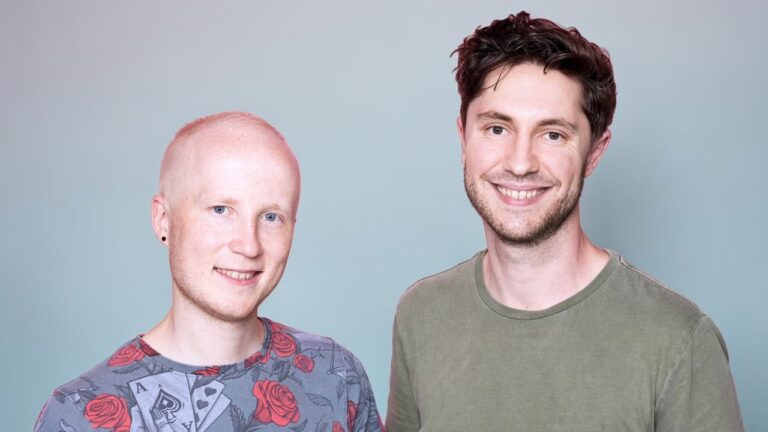Deep tech startup Altrove has raised €3.7M in a pre-seed funding round led by Contrarian Ventures, alongside some strong angel investors such as Emblem, Thomas Clozel (CEO Owkin), Julien Chaumond (CTO HuggingFace) and Nikolaj Deichmann (3Shape).
By developing alternatives to essential materials, including those containing rare earth elements (REEs), Altrove is addressing the critical challenge of achieving climate goals while ensuring geopolitical autonomy and economic competitiveness.
The company was founded in early 2024 by Cambridge University graduate Dr Joonatan Laulainen and second-time Entrepreneur First founder Thibaud Martin.
To find out more, we spoke to Thibaud Martin, CEO of Altrove.
Exceeding the capabilities of AI-based material prediction
Martin explained that unlike recent AI materials startups, Altrobe goes beyond predicting what new materials might exist, but instead focuses on finding the best recipes for manufacturing alternative materials at scale.
The company has developed proprietary characterization techniques that iteratively learn from each experiment, accelerating the discovery process by up to 100 times.
Martin said the company’s work has many similarities to the use of AI in drug discovery.
“We filter out the noise of all predicted materials, determine the recipes needed to make them, and identify those that are interesting for specific industrial applications.”
“Our job is to do a lot of experiments in the lab at a very high speed and with high throughput, actually make the material, and then hand it over to R&D so they can implement it into devices.
The company uses automated laboratories to conduct experiments to determine the best combinations of ingredients to create replacements for existing elements such as gallium, germanium, cobalt and nickel.
Dependence on critical raw materials may soon replace today’s dependence on oil.
According to the EU (Study on Critical Materials, 2023), “The OECD predicts that global demand for materials will double from the current 79 billion tonnes to 167 billion tonnes in 2060. Global competition for resources will intensify over the next decade.”
European demand for rare earth elements is predicted to increase five-fold by 2030, driven by the rapid growth of key transition technologies such as wind turbines, solar panels and electric vehicle (EV) batteries, which rely heavily on magnets.
Moreover, China’s dominance in the rare earth supply chain, including mining, processing and magnet manufacturing, creates vulnerabilities for Western countries. This dependency exposes Western countries to potential disruptions, price volatility and unsustainable mining practices in China.
China recently banned the export of rare earth processing technology in the second half of 2023.
Sectors such as EV battery manufacturing are also aware of REE’s challenges.
As Martin points out, “Western countries as a whole do not produce these materials.”
For example, cobalt mining is associated with habitat destruction, soil and water pollution, human rights violations and unsafe working conditions. In response, companies are using cobalt-free lithium iron phosphate (LFP) batteries in most of their vehicles.
But Martin explains:
“When you remove cobalt from a battery, as Tesla did, there are trade-offs: the battery becomes heavier, has lower energy density and a shorter lifespan. We are specifically trying to target industries where there are no alternatives other than REEs.”
One example is a permanent magnet, which generates its own permanent magnetic field without the need for an external power source and is used to convert mechanical energy into electrical energy.
It is used in electric vehicles, radar, mobile phones, headsets, etc. It is rich in neodymium, a rare earth mineral of which China controls 98 percent.
According to Martin:
“Neodymium exists in small quantities in Australia and Japan, but from a price perspective, only China can mine, extract and refine it and sell it at a price that is affordable for many industries.
So there are a lot of reasons not to source everything from these countries — from a geopolitical standpoint, a regulatory standpoint, a sustainability standpoint, and many other standpoints — so customers are looking for alternatives.”
From predictions to recipes
Recent breakthroughs in AI-driven materials discovery from leading companies such as DeepMind have predicted around 400,000 new stable inorganic materials, along with research projects from Microsoft, IBM and ETH Zurich.
These projects focus on basic models and predicting what materials might exist, but not on how to actually create them and turn them into reality.
Altrove finds the best ways to produce relevant materials on an industrial scale by developing AI models combined with automated synthesis labs to accelerate the discovery process by up to 100x. Altrove has invented proprietary techniques in characterization to iteratively learn from each experiment.
The company has already begun working with the sourcing, manufacturing, and research and development departments of customers across industries including automotive, defense and electronics.
Altrove is also working on replacing piezoelectric materials used in sensors, touchscreens, energy harvesting and many other industry and customer technologies.
Martin explained:
“These are formula-driven materials. This allows for scale-up. For example, if you’re making a magnet, if it works at 10 grams, it will work the same way 1,000 times over.”
As for fundraising, Martin acknowledges:
“We are dealing with many challenges in Europe: AI, sustainability, sovereignty, reindustrialization. And it’s not just a European issue. For example, when we’re talking to our American customers, yes, they don’t have the Critical Materials Act, but they have all these other challenges.”
“We are thrilled to be partnering with NVIDIA to bring this technology to market,” said Rokas Peciulaitis, founding partner at Contrarian Ventures, which led the funding.
“The main driver for our investment in Altrove is the team’s exceptional blend of industrial expertise and technical excellence. Having conducted over 100 customer interviews with leading component developers across Europe, they have developed a solution that truly bridges the gap between AI-driven materials discovery and industrial applications.”
The funding will accelerate the development of the company’s core technologies, which are currently focused on alternatives to rare earth compounds used in transition technologies, electric vehicles and advanced electronics.
Main image: CTO Dr Joonatan Laulainen and CEO Thibaud Martin.


